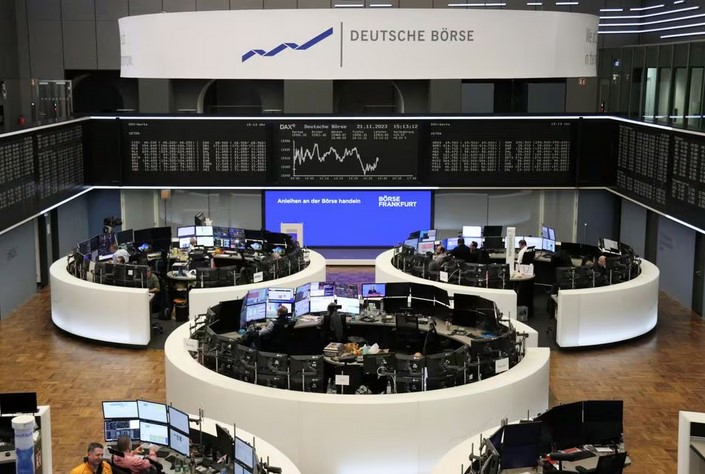
The European Shares stock market experienced a pause in its recent upward trajectory on Thursday. This article delves into the factors contributing to this shift, emphasizing concerns about the industrial sector’s impact on the Eurozone’s largest economy.
Recent Market Performance
The pan-European STOXX 600 (.STOXX) exhibited a 0.3% decline after reaching a more than four-month high. Similarly, Germany’s DAX (.GDAXI) saw a 0.2% dip, following its attainment of an all-time high in the previous session.
Expert Analysis
Daniela Hathorn, a senior market analyst at Capital.com, expressed reservations about the market’s overextended rally. Despite acknowledging the momentum, she suggested the possibility of a correction.
German Industrial Woes
New data revealed challenges in Germany’s industrial sector, with an unexpected fall in industrial production for October. This came on the heels of a surprising decline in industrial orders in the same month, intensifying concerns about the sector’s performance.
Eurozone Economic Indicators
Eurostat, the European statistics agency, confirmed a 0.1% decrease in gross domestic product (GDP) for the euro zone in the third quarter. This added to the overarching worries about the macroeconomic landscape.
ECB’s Response and Market Sentiment
A Reuters poll indicated a potential rate cut by the European Central Bank (ECB) as early as the second quarter of the following year. Market sentiment seemed to reflect concerns, with shares of Spanish and Portuguese banks experiencing declines between 2.3% and 5.9%.
Banking Sector Overview
IG analyst Diego Morin suggested a market perception that the favorable conditions for the banking sector might soon end. Anticipating no rate hikes and potential cuts in 2024, he pointed to a possible shift in the sector’s dynamics.
Corporate Moves: BASF’s Restructuring
BASF (BASFn.DE) announced a significant overhaul, planning to convert its agriculture, battery materials, and coatings businesses into autonomous units. This strategic move aims to enhance earnings and marked a notable shift for the traditionally integrated German chemicals giant.
Games Workshop Group’s Setback
In contrast, shares of Games Workshop Group (GAW.L) experienced a notable setback, tumbling 13.7% following a half-year trading update from the miniature wargame maker.
Thyssenkrupp’s Challenges
Thyssenkrupp (TKAG.DE) faced a 5.4% decline as it grappled with the prospect of addressing financial considerations to secure Daniel Kretinsky as a co-owner of its steel business.
Conclusion
The European shares’ slip reflects a nuanced interplay of economic indicators, market sentiment, and corporate dynamics. While concerns about the industrial sector persist, strategic moves by corporations contribute to the evolving landscape.
FAQs (Frequently Asked Questions)
1. What triggered the recent decline in European shares? The decline in European shares can be attributed to a combination of factors, including challenges in Germany’s industrial sector, Eurozone economic indicators, and concerns about the banking sector.
2. How did the ECB respond to the economic worries? According to a Reuters poll, the ECB is contemplating a rate cut by the second quarter of the following year, signaling a proactive response to the economic challenges.
3. What prompted BASF’s restructuring? BASF’s restructuring aims to boost earnings by transforming its agriculture, battery materials, and coatings businesses into autonomous units, representing a major strategic shift for the company.
4. Why did Games Workshop Group experience a significant drop in shares? Games Workshop Group faced a notable setback, with shares tumbling 13.7%, following a half-year trading update, indicating challenges or concerns within the company.
5. How is Thyssenkrupp addressing its challenges? Thyssenkrupp may need to address financial considerations, such as providing cash or holding pension liabilities, to secure Daniel Kretinsky as a co-owner of its steel business, leading to a 5.4% decline in its shares.
